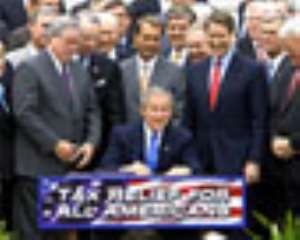
The US House of Representatives has passed a $2.8 trillion budget after Republican party moderates won a promise for increases on education, health and other social programmes.
The vote passed by a majority of 218-210. No Democrats voted for the Republican budget, which sets broad outlines for spending throughout the government.
John Boehner, the House majority leader and an Ohio Republican, said the budget would address conservatives' concerns about deficits.
"With revenues rising and holding the line on spending we can, in fact, balance the budget in the next four or five years," he said.
But the House budget forecasts a $348 billion deficit next year and it could be higher, since the measure sets aside only $50 billion for the wars in Iraq and Afghanistan, which have been running at about double that cost annually.
The plan also endorses Bush's proposed 7% increase in the core defence budget for next year.
With US government debt escalating, the budget authorises a $653 billion increase in borrowing authority next year to total $9.62 trillion.
A senior Democrat on the House budget committee, John Spratt, said on Wednesday: "Over the last five years we will have experienced ... with this budget, the five largest deficits in nominal terms in the history of the United States."
Tax cuts
Earlier on Wednesday, George Bush, the US president, signed into law a $70-billion tax-cut bill that includes an extension of tax breaks for the wealthy.
Republicans defended the cuts as a necessary ingredient to keep the US economy buoyant, but Democrats say they benefit only the rich.
The House vote came after Republican leaders worked to win enough support from their own moderate members, who won an additional $7.1 billion in funding for health, education and other domestic social programmes as November midterm elections approach.
The programmes have suffered in previous budgets.
Some of the money, about $1 billion, might be transferred from a fund intended to rebuild Iraq.
Crucial year
There are doubts the House and Senate will take the final step of resolving their differences to craft a unified budget plan.
But Wednesday's vote was important to Republicans, who do not want problems in an election year caused by failing to pass a budget in the House for the first time since 1975.
Of the $2.7 trillion in the budget, most of the money is for programmes operating on automatic pilot, such as Social Security retirement benefits and government-run healthcare programmes for the poor and the elderly.
Also as part of the $2.7 trillion, this House budget would provide $873 billion for programmes Congress must renew each year, about $9 billion less than the Senate version.




 We’ll no longer tolerate your empty, unwarranted attacks – TUC blasts Prof Adei
We’ll no longer tolerate your empty, unwarranted attacks – TUC blasts Prof Adei
 Bawumia donates GHc200,000 to support Madina fire victims
Bawumia donates GHc200,000 to support Madina fire victims
 IMF to disburse US$360million third tranche to Ghana without creditors MoU
IMF to disburse US$360million third tranche to Ghana without creditors MoU
 Truck owner share insights into train collision incident
Truck owner share insights into train collision incident
 Paramount chief of Bassare Traditional Area passes on
Paramount chief of Bassare Traditional Area passes on
 Two teachers in court over alleged illegal possession of BECE papers
Two teachers in court over alleged illegal possession of BECE papers
 Sunyani: Victim allegedly shot by traditional warriors appeals for justice
Sunyani: Victim allegedly shot by traditional warriors appeals for justice
 Mahama vows to scrap teacher licensure exams, review Free SHS policy
Mahama vows to scrap teacher licensure exams, review Free SHS policy
 Government will replace burnt Madina shops with a new three-story, 120-store fac...
Government will replace burnt Madina shops with a new three-story, 120-store fac...
